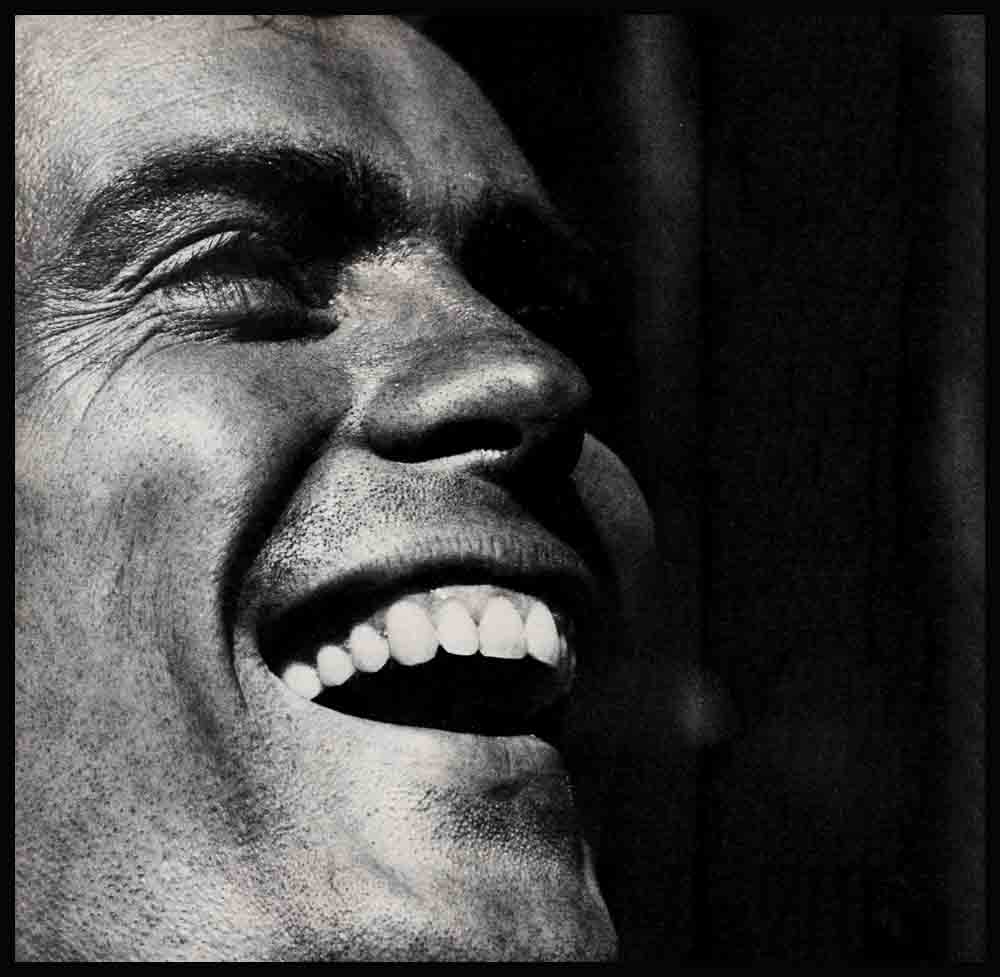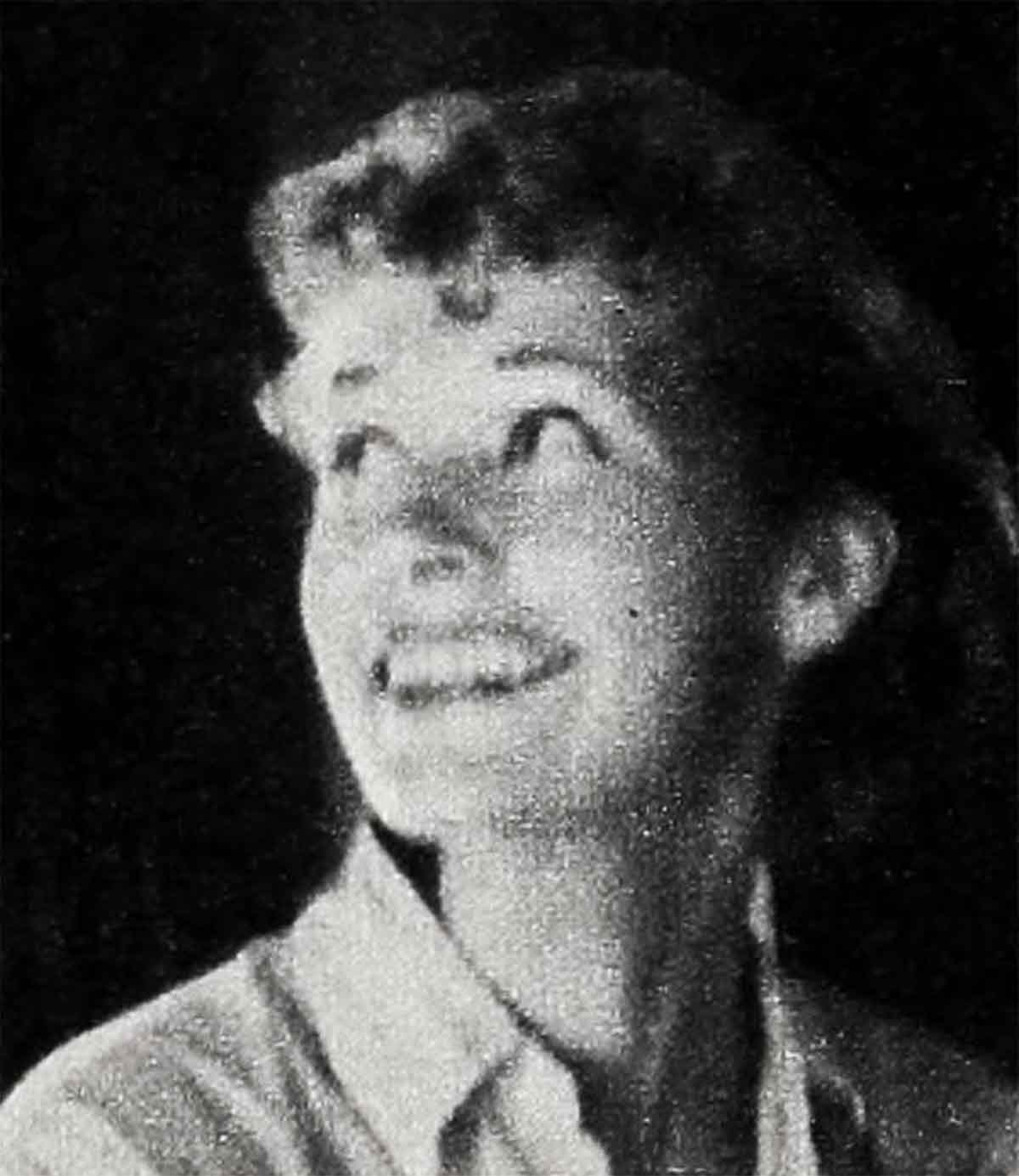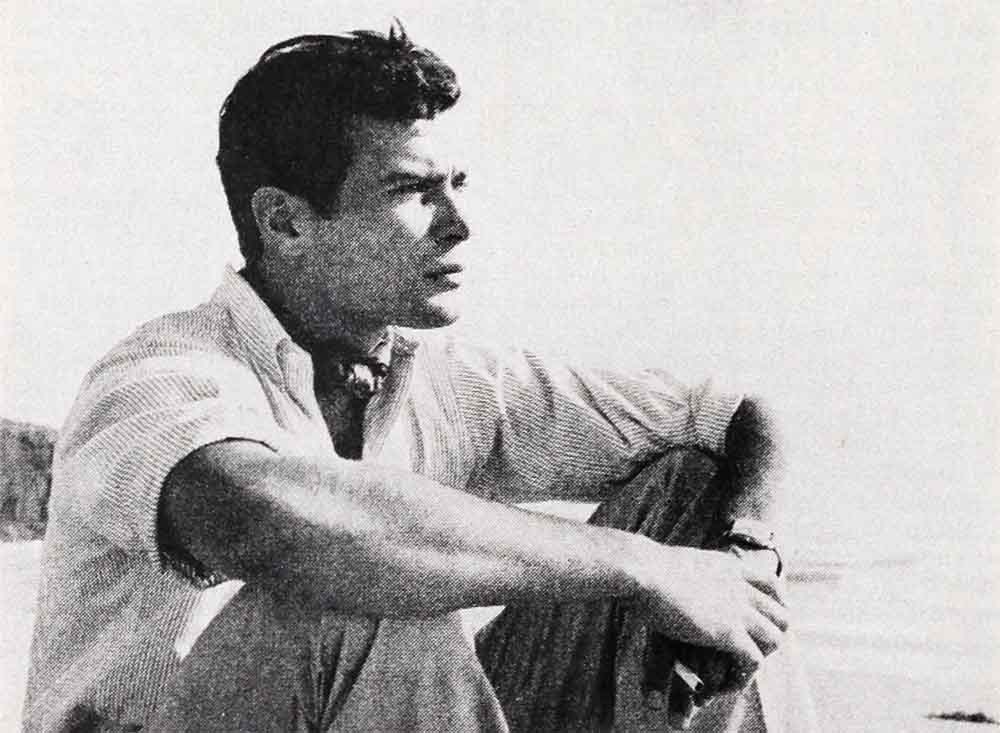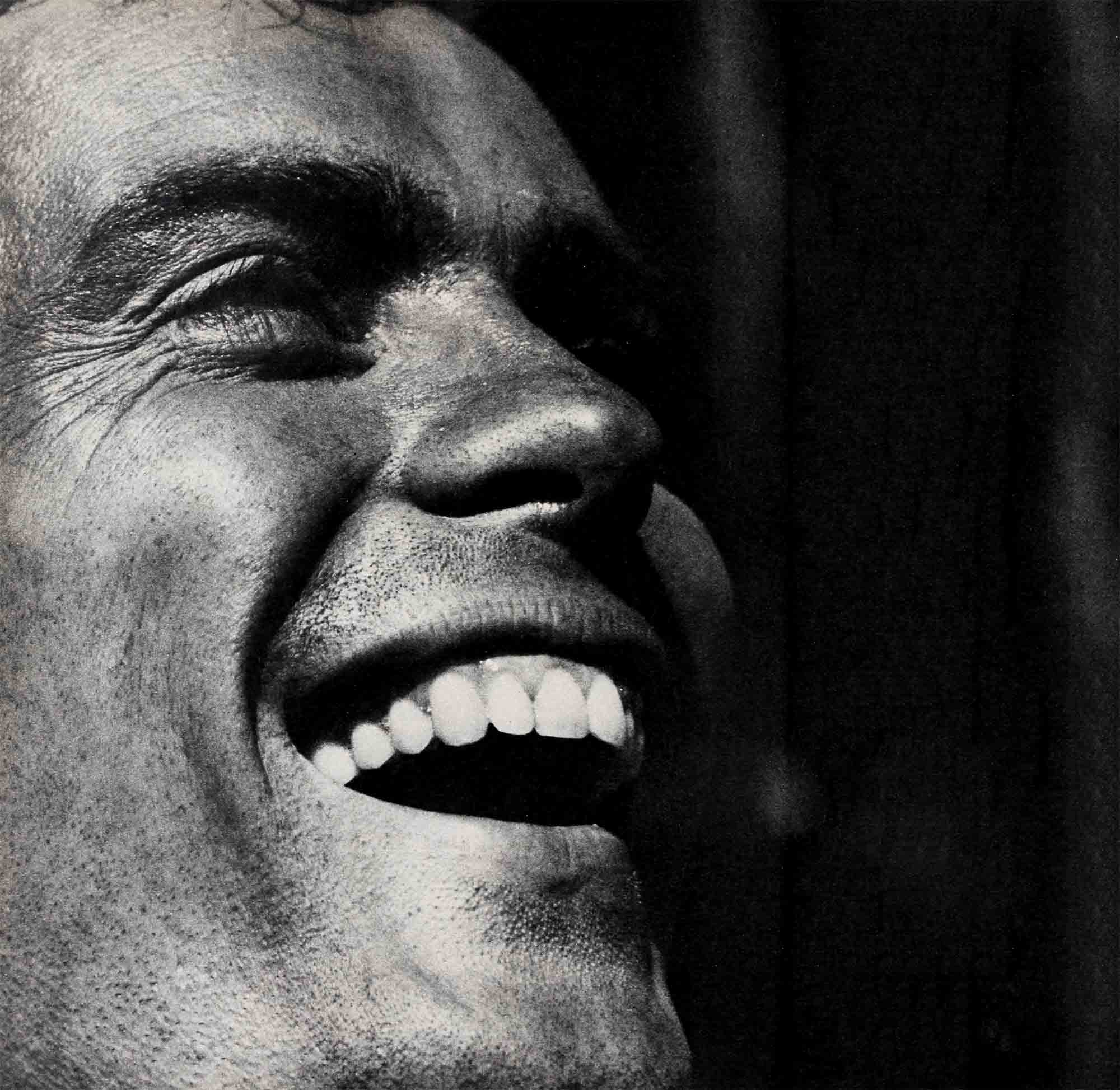
Kerry Smith: “For Four Hours, I Was Gardner McKay’s Wife”
Listen, Kerry, will you . . .” The tall, handsome boy was struggling to say something that must have been very important to him. He was so nervous, he was actually stuttering. He wouldn’t even come inside my apartment—just rang our bell and stood leaning his lanky six-foot-three frame against the doorway.
Finally he blurted it out. “Kerry, will you be my wife for four hours?”
I stared at Gardner McKay, stunned. I couldn’t believe my ears!
“Why Gard . . . I . . . never thought about it,” I answered, “even for four hours!”
AUDIO BOOK
Nothing surprised me about Gard so I didn’t even ask him why, I just followed him. I let him take my hand and rush me downtown to look at a wonderful studio apartment on the far fringes of Greenwich Village. We had to hurry, or it would get snatched by somebody else if we didn’t nab it first. “And it’s a great place,” he enthused. “There’s just nothing else like it at the price.”
Before I knew it, we were trailing be- hind a rent agent and toiling up endless stairs in a dingy hall. He unlocked a door on the worst place I ever saw in my life. Gard was sure right—there couldn’t be another like it, not at any price! But Gard looked thrilled, which I sure wasn’t, and the man saw that. He said, “When your own things are in, you two will love it. The owners wouldn’t rent this studio to just anybody, only a nice respectable married couple. They don’t want bachelors wrecking the place.”
What’s to wreck, I wondered. With that whiff coming in from the meat-packing district around here? And not even a real bathroom in the place? And they’re choosey yet—no bachelors!
But Gard was saying eagerly, “We’ll take it.” So I didn’t say a word. He paid a deposit, signed a lease, and we left. It wasn’t until we were out in the street and around the corner that he grabbed my hand and pumped it up and down.
“Golly, you were swell to do this for me, Kerry,” he raved. “I can’t thank you enough! How many girls would be sport enough to pose as a fellow’s wife? Now I’ve got the lease, they can’t go back on it.”

That nice boy who took showers
I couldn’t help howling with laughter at the deal we’d put over. If that dump was what Gard wanted for himself, I was glad to help. I said, giggling, “Honestly, Gard, I was petrified that any minute he’d see this was only my college ring.” I had turned it around so that the plain band showed like a wedding ring.
We walked off, arm in arm, still laughing. We went for a nice lunch to one of his “mobile” places, kidding each other that this was our wedding celebration. Finally, after a few hours around the Village, I had to take the subway for the apartment uptown where Mom and I lived. That was the end of my brief “marriage” to Gardner McKay—but the beginning of a fine, long friendship.
We’d only dated twice since the night I met him at a party in Greenwich Village. Oh, I could tell he was sweet, sensitive and very shy. And the crowded, noisy party bothered him; it seemed to scare him. He was honestly grateful to me for sitting off in one quiet little spot we managed to find, and talking to him alone.
We talked for hours. I don’t remember anyone else at that party. Only Gard, shyly letting me draw him out about himself. He told me he’d come down from Cornell University for spring vacation and decided not to go back—he was too crazy about art. He was struggling to get started in New York with his talents—photography and a skill for making mobiles that everybody admired but nobody bought.
“But at least I eat,” he said with a smile. He explained that owners of restaurants in the Village, and bars and movie houses, were always glad to let him dangle his mobiles from their ceilings. He didn’t get paid for them, but he got all the free food he could eat and all the movies he wanted to see.
So, for our first date, we enjoyed dinner and a movie on the strength of his mobiles. The second date, we spent mostly walking for miles and talking our heads off. And not once, on either of those dates, did he kiss me! He was shy and I liked him for it.
My mother liked him, too. It wasn’t long before the shy Gard was so much at home with us that he dropped in regularly—to take showers. He had to take them somewhere, he couldn’t in that dream apartment he’d rented with my valuable assistance!
One afternoon, my mother was giving a tea party for a dozen or so friends, when the doorbell rang and Gard walked in. I wasn’t home, but Mother told me about it later. She introduced him all around. He said, “How do you do,” then politely excused himself and went into the bathroom. A few minutes later you could hear the shower running, because the plumbing in our apartment was very noisy. And over the running water, you could hear the cheerful sound of a man whistling in the shower. Mom said the women didn’t utter more than ten words, they were listening so hard, with the funniest expressions on their faces.
Finally, the bathroom door opened and out came Gard, completely dressed again. He said, “Thank you” to Mother, and “Nice to have met you” to the ladies, and walked out the front door.
For one full minute, there was a stunned silence. Then one of Mother’s oldest friends said, “Lilly, do you realize that very polite young man just went into your bathroom and took a shower?”
“Of course,” Mother said calmly. “He’s a very clean, polite young man.”
To this day, Mother still refers to Gard as “that nice boy who always took showers in our apartment.” But what I fondly remember is the fun we had together. Sailing was the love of his life, and we did that when he could afford it. Mostly, we walked, talked, drank coffee in Louie’s, our favorite restaurant, haunted junk shops to fix up his studio, and had the most luxurious picnics imaginable in Central Park. That was because of the mobiles. We’d have things like roast chicken, French bread, and even a bottle of wine. I was going to a girls’ school in New York, but he wouldn’t meet me at the school, he was too shy. There was something about the way females looked at him that made him stutter and stumble all over himself. On the other hand, you couldn’t blame them for looking at him that way, either. But I bet they’d be surprised if they knew how darn trustworthy such a handsome fellow could be. I bet nobody’d believe it!
I am almost six feet tall, and Gard is six-foot-three. We’re both shy, and I don’t think he kissed me more than half a dozen times in those happy young years we spent together. He set the pace himself one night—something not many men will do.

He wasn’t always wacky
We were at his apartment, washing dishes after dinner and he kissed me on the top of my head. I turned and kissed him back. Next thing I knew, he had thrown my coat over my shoulders and was dragging me down the stairs two at a time. He didn’t say a word until we reached the subway entrance on the corner and then he turned me around and looked me straight in the eyes.
“Ker, I want you to remember one thing. When you’re in a man’s apartment, don’t trust him. Not that he’s a bad guy—he’s just human—and you’re a different kind of girl.” With that, he gently shoved me toward the stairs to the subway and went on down the street. I was just eighteen then, and he was twenty. He was very grown-up for his age but both of us still had a lot more growing up to do. Had we been in too much of a hurry then, we wouldn’t be the close friends we are now.
He was a funny mixture of gentle shyness and mad humor. One night, we were leaning against an empty taxicab waiting for another couple to come out of Louie’s, in the Village, when a drunk reeled around the corner and fell into the cab.
“Take me to Broadway and 49th, driver,” he ordered.
Gard jumped in, turned on the ignition and gunned the motor for fifteen seconds. Then he shut it off, hopped out, and opened the door for the drunk.
“I’ll be hanged if I’ll ever drive with you again,” mumbled the passenger. “You drive too fast.”
But don’t think Gard was always that wacky. His struggles with himself did heartbreaking things to him. You’d think the mirror, alone, would give him the confidence he needed so painfully. But he never could see himself as others did—handsome, gifted, intelligent. He hadn’t the slightest notion of all he had to offer. He was alone so much, and he had such drive, that everything he did, he learned to do perfectly. But it was never enough; he was never satisfied. Why? Maybe because his father was a very big advertising executive, and his family had always been prominent, and his great-great-grandfather had been the finest ship builder of his time. So Gard had to prove something, he had to be the finest whatever-he-could-be. But the struggle was tough. And it put him in mortal terror of people.
Just how terror-stricken he could get, I learned soon after I became a friend to be trusted. I was home, one evening, and the phone rang.
“Kerry? Listen.” Gard’s voice was low and hurried. “You’ve got to get here fast—you’ve got to get me out of this!”
“Oh Gard! Gard—where are you?”
“I’m in the penthouse at the Sherry Netherland. At a party. And. . .”
“Okay,” I said. “I’m on my way.”
I slapped on some good clothes and hopped a cab. Soon a butler was leading me into a fabulous drawing room with at least a hundred elegant guests. It was strictly out of a movie. I spotted Gard in a far-off corner hunched on a tiny satin ballroom chair. At his feet sat three internationally famous glamor girls, two of them old enough to be his mother. All three were looking up into his face adoringly. But he was looking scared.
I swooped on the little group saying, “Darling, I hate to tear you away but we’ll be late for the Malcombs.” Whoever they were!
You’d never think a six-foot “threer” could shoot out of a little chair like a rocket, but he did. I grabbed his arm and we sailed out. We ended up walking from Fifty-ninth and Fifth down to the Village. He needed air!
“All th-those strangers,” he groaned. “And th-those f-female l-l-leeches!” He was stuttering again—he only did it when he got panicky.
“Nobody forced you to go,” I sort of snapped. “I rescued you, so quit carrying on! Next time don’t get yourself into something you can’t get yourself out of.”

The day Gard collapsed
He never forgot my words. Some months later, we were sailing for Fire Island on a twenty-five foot ketch he had acquired—no motor, only sails. We invited two other couples along and none of us were sailors except Gard. He was kept busy with the sails and rudder while we ate hamburgers, drank Cokes and relaxed.
When we came to a bridge that had to be opened for us, he jumped up on the pilings to help the bridge-keeper. Next thing we knew, the ketch was floating away with Gard stranded on the pilings. At first, he stared after us with shock, while we stared back the same. Then he started to laugh. That’s what we saw as we drifted out to sea—Gard laughing!
We floated for an hour until the Coast Guard picked us up. They said Gard had called and told our plight—five landlubbers drifting out to sea.
Back in town we headed for Louie’s, tired, hungry, a little wet and pretty mad. We hoped to find Gard and strangle him. We sat drinking coffee till he walked in, carrying a brown paper package.
“For my friends,” he said. And to me, “You were right, Kerry—never get yourself into anything you can’t get yourself out of.” We tore open the package and there were five separate copies of “The Small Boat Skipper and His Problems.” I hit Gard with my copy, but later I memorized it from cover to cover.
“Good girl,” he told me, then. “Whatever you’re trying to do, learn the ropes or you’ll sink every time.”
He should know! He was trying to do half-a-dozen things—writing, painting, designing mobiles, sailing, among other things, and learning the ropes thoroughly for each. Until one day, he collapsed right on the dock. The doctor said he’d been overdoing it to the point of exhaustion and was suffering an attack of mononucleosis. That put him in the hospital.
And did that teach him to slow down? Hah! He tried something new. Strictly for laughs and money, he took a job doing a razor blade commercial. He wasn’t very keen about the business, but he needed new sails for the ketch and it seemed an easy way to raise the cash.
The rest is history. The commercial was seen by movie execs and Gard was signed to a long-term contract.
“Why not?” he said the night he came over to the apartment to tell us. “I’ll be able to buy a new boat, I can work on my mobiles in my spare time. It’ll be pretty much the same life only on the West Coast. Of course, there’ll be lots of new people to meet, but a guy’s got to get out and circulate.”
He sees the light of life
This was Gard? Gardner McKay? A boy who, two years before, couldn’t walk across a room without falling over his feet if people were watching him? Who felt sick if he was exposed to a roomful of strangers? Where did the confidence come from all of a sudden?
I believe that sensitive and unsure people are hiding in a small, dark room where they live out the years in fear and trembling behind a locked door. You never know what thing, little or big, will unlock that door. Even a little bit of success might do it for someone who’s known failures. Or a good friendship for one who’s been lonely too long. Or a bit of good luck for the always-hard-luck guy. It doesn’t matter—just so someone opens the door to let a human being out of the hiding place he’s made for himself.
When that happens, when, for the first time, he sees the light of life, he wants to rush around and make up for lost time, embracing everything and everybody in this fine new world.
I know that’s what happened to Gard. He told me so. He said, “Kerry, the first time I got before a camera, I expected to panic. I thought, oh boy, a stuttering actor! But it didn’t happen! I felt great! I felt like making people laugh, or cry, or sing—anything to bring them out of themselves the way I was brought out of myself. This was for me. It was like . . . well, Kerry, it was like coming home!”
THE END
SEE GARDNER ON ABC-TV IN “ADVENTURES IN PARADISE,” MONDAYS, 9:30-10:30 P.M., EDT.
It is a quote. PHOTOPLAY MAGAZINE SEPTEMBER 1960
AUDIO BOOK




